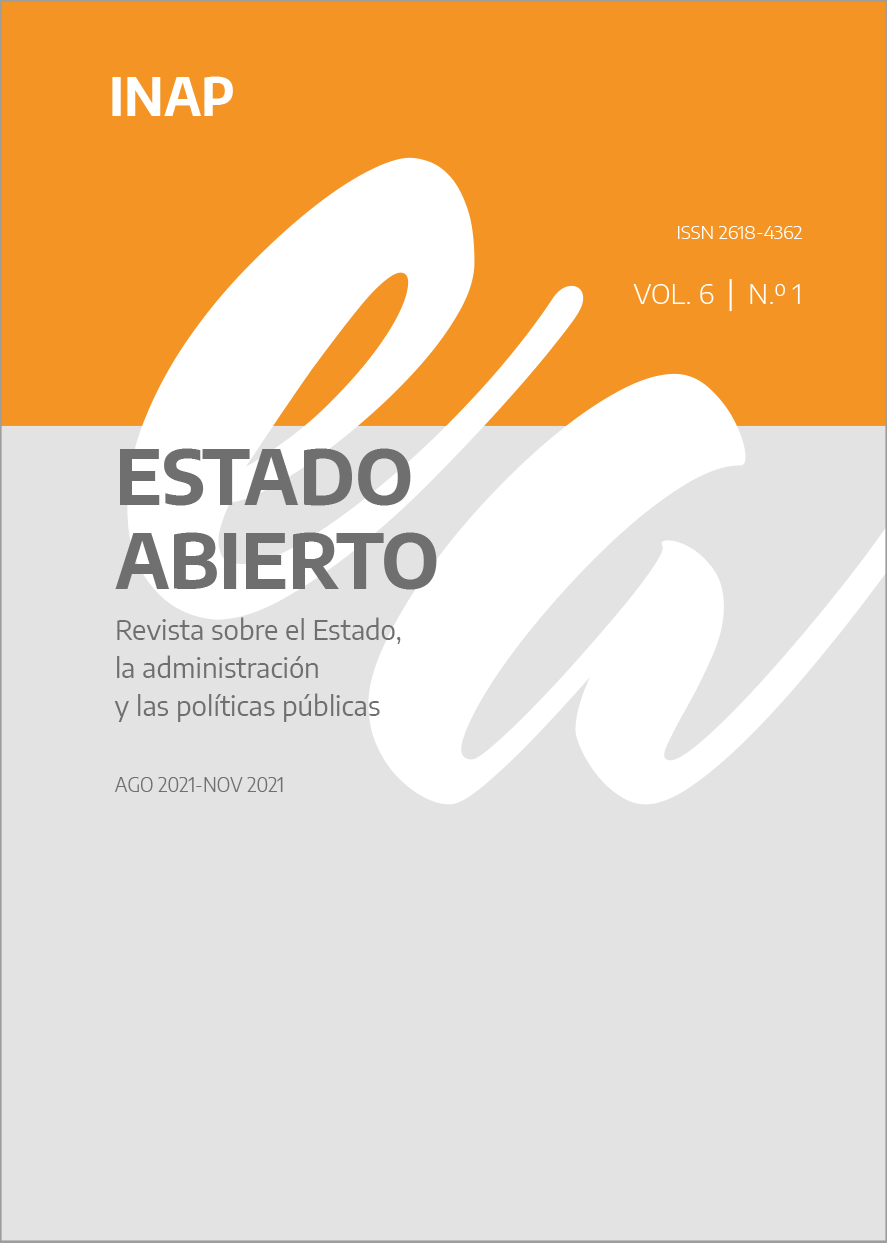La planificación estratégica en el sector público
Estado del arte y reflexiones generales
Resumen
La planificación estratégica es una herramienta central en el proceso de toma de decisiones, tanto para la adopción e implementación de políticas como para su posterior evaluación. En este trabajo realizamos un pequeño análisis sobre sus antecedentes, para reflexionar posteriormente a partir de diferentes aportes que han completado esta concepción a lo largo del tiempo. Esto posee un impacto relevante no solo para el análisis de los procesos políticos sino para propia gestión pública en un mundo cada vez más cambiante, complejo e incierto.
Abstract
The strategic planning is a central tool in the decision-making process, both for the adoption and implementation of policies and for their subsequent evaluation. In this work we carry out a small analysis of its antecedents, reflecting later on from different contributions that over time have completed this conception. This has a relevant impact not only for the analysis of political processes but also for public management in an increasingly changing, complex and uncertain world.
Descargas
Citas
Ackerman, F. & Eden C. (2011). Strategic Management of Stakeholders: Theory and Practice. Long Range Planning, 44(3), 179-196.
Andrews, R., Boyne, G. A., Law, J. & Walker, R. (2012). Strategic Management and Public Service Performance. Palgrave.
Ansell, C., Sorensen, E. & Torfing, J. (2020). The COVID-19 Pandemic as a Game Changer for Public Administration and Leadership? The Need for Robust Governance Responses to Turbulent Problems. Public Management Review, 23(7), 949-960.
Ansoff, I. (1965). Corporate Strategy: An Analytic Approach to Business Policy for Growth and Expansion. McGraw-Hill.
Axelrod, R. (2006). An Evolutionary Approach to Norms. American Political Science Review, 100(4), 1095-1111.
Bryson, J. (2011). Strategic Planning for Public and Non-Profit Organizations: a Guide to Strengthening and Sustaining Organizational Achievement. Jossey Bass.
Bryson, J. & George, B. (2020). Strategic Management in Public Administration. En B. Guy Peters & I. Thynne (eds.), The Oxford Encyclopedia of Public Administration. Oxford University Press.
Chandler, A. D. (1962). Strategy and Structure: Chapters in the History of the Industrial Enterprise. MIT Press.
Davenport, T. H. & Prusak, L. (1998). Working Knowledge: How Organizations Manage What They Know. Harvard Business School Press.
Drucker, P. F. (1964). Managing for Results: Economic Tasks and Risk-Taking Decisions. Harper and Row.
Dunn, W. (1981). Public Policy Analysis. Prentice-Hall.
Ferlie, E. & Ongaro E. (2015). Strategic Management in Public Sector Organizations. Concepts, Schools, and Contemporary Issues. Routledge.
Freedman, L. (2016). Estrategia. Una historia. La Esfera de los Libros.
Foss, N. J. (2020). Behavioral Strategy and the COVID-19 Disruption. Journal of Management, 46(8), 1322-1329.
Gaddis, J. L. (2019). Grandes estrategias. Taurus.
Gurel, E. (2017). Swot Analysis: A Theoretical Review. The Journal of International Social Research, 10, 994-1006.
Hansen, J. & Ferlie, E. (2016). Applying strategic Management Theories in Public Sector Organizations: Developing a Typology. Public Management Review, 18(1), 1-19.
Hernández, V. (2018). La gestión del conocimiento en las organizaciones. Alfaomega.
Joyce, P. (2015). Strategic Management in the Public Sector. Routledge.
Kahneman, D. (2011). Thinking, Fast and Slow. Farrar, Straus y Giroux.
Kingdon, J. (2002). Agendas, Alternatives and Public Policies. Little Brown.
Ley Borrás, R. (2001). Análisis de incertidumbre y riesgo. Ediciones Consultoría en Decisiones.
Levinthal, D. A. & March, J. G. (1993). The Myopia of Learning. Strategic Management Journal. 14(Special Issue: Organizations, Decision Making and Strategy), 95-112.
Longo, F. (2020). La gestión pública de la pandemia: diez aprendizajes. Estado abierto, 5(1), 131-143.
Méndez, J. L. (2020). Políticas públicas. Enfoque estratégico para América Latina. Fondo de Cultura Económica.
Méndez, J. L. (2020b). Leadership and Change in the Public Sector. Oxford Research Encyclopedia of Politics. https://doi.org/10.1093/acrefore/9780190228637.013.1397
Metcalfe, L. (1978). Policy Making in Turbulent Environments. En K. Hand y F. W. Scharpf (coords.), Interorganizational Policy Making: Limits to Coordination and Central Control. Sage.
Mintzberg, H. (1994). The Rise and Fall of Strategic Planning: Reconceiving Roles for Planning Plans. Free Press.
Nonaka, I. & Takeuchi, H. (1995). The Knowledge-Creating Company. How Japanese Companies Create the Dynamics of Innovation. Oxford University Press.
Nutt, P. & Backoff, R. (1992). Strategic Management of Public and Third Sector Organizations: A Handbook for Leaders. Jossey Bass.
Oszlak, O. El Estado en la era exponencial. INAP-CLAD-CEDES.
Poister, T. H (2010). The Future of Strategic Planning in the Public Sector: Linking Strategic Management and Performance. Public Administration Review, 70(1), 246-254.
Porter, M. (1980). Estrategia competitiva. Pirámide.
Riker, W. (1986). The Art of Political Manipulation. University Press.
Schattschneider, E. E. (1960). The Semisovereign People. Rinehart and Winston.80
Schröder, P. (2004). Estrategias políticas. Fundación Friedrich Naumann-OEA.
Sousa, J. D. y Arbesú, L. I. (2018). Planificación gubernamental. Oxford University Press.
Stanton, T. & Webster, D. W. (2014). Managing Risk and Performance: A Guide for Government Decision Makers. Wiley.
Taleb, N. N. (2010). The Black Swan. The Impact of the Highly Improbable. Random House.

La Revista Estado Abierto y su contenido se brindan bajo una Licencia Creative Commons Atribución-No Comercial 2.5 Argentina.Es posible copiar, comunicar y distribuir públicamente su contenido siempre que se cite a los autores individuales y el nombre de esta publicación, así como la institución editorial. El contenido de la Revista Estado Abierto no puede utilizarse con fines comerciales.


